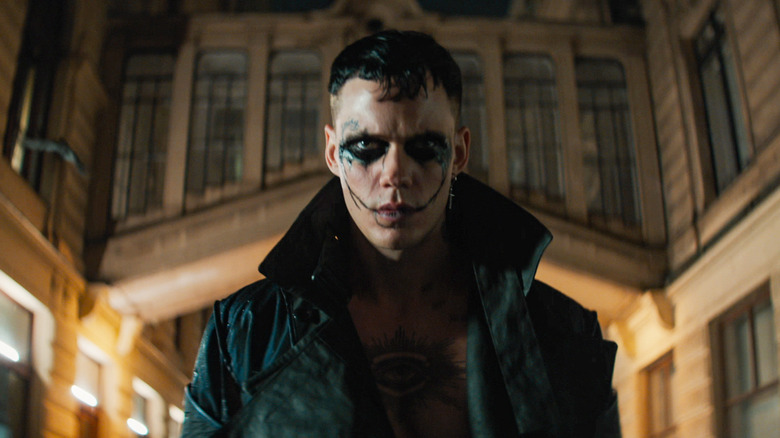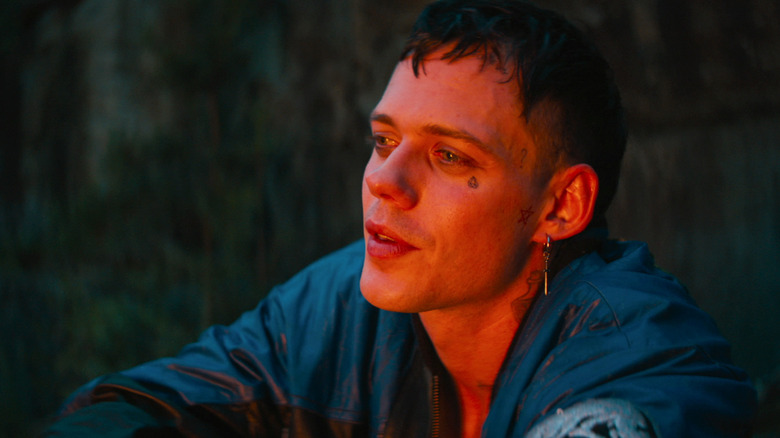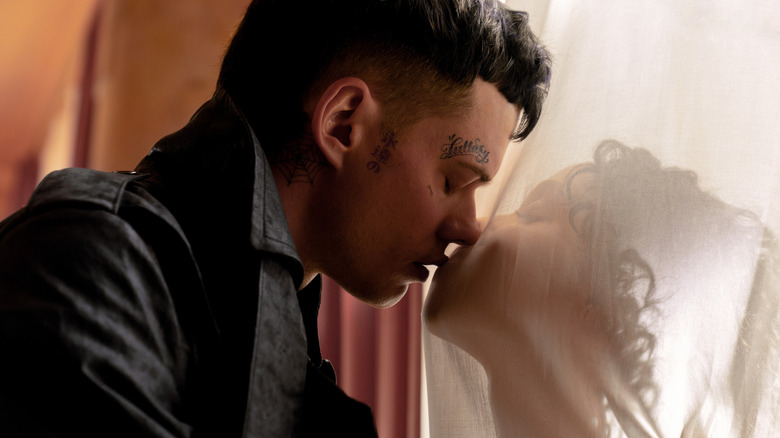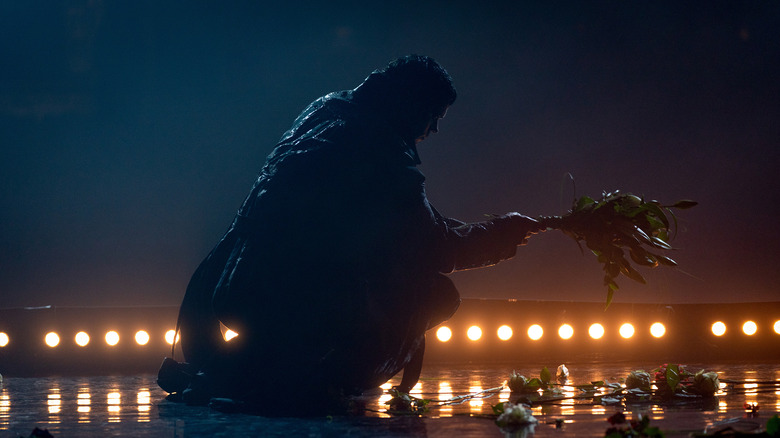The Crow Review: A Dull, Lifeless, Meaningless Remake
When I watch any film, I expect a certain degree of clarity. Events and emotions should flow logically from scene to scene, communicating to me a basic story or psychological journey. The logic needn't be straightforward, simple, or even realistic — complex and abstract dream logic is acceptable — but I should be able, as a viewer, to follow one scene to the next, understanding the way space and time work.
Rupert Sanders' new rendition of "The Crow," based on the tragic 1989 comic book by James O'Barr, lacks that vital clarity. Thanks to sloppy editing and a general lack of basic storytelling acumen, events speed past without much explanation, emotional resonance, or, in some scenes, basic communication. Despite being trapped in production hell for over a decade (and the elongated saga of this film's making has been covered ad nauseum for years), "The Crow" feels like a rush job, an idea that wasn't fully understood before the cameras began rolling. The concept is never made wholly clear, and the rules of the universe are oblique. This is especially aggravating, seeing as Sanders' film is the fifth feature to be based on O'Barr's comic. Those were in addition to all the comics, novels, video games, and a 1998 TV series.
One might think a Goth-inflected supernatural revenge picture, culled from 30 years worth of pop-cultural detritus, would be trim and uncomplicated, dealing with relatable, base emotions like heartbreak and wrath. One might think wrong.
Sanders ("Snow White and the Huntsman," "Ghost in the Shell") instead made a somewhat stylish, but wholly meaningless film as lifeless as its undead hero. There have been some truly terrible "Crow" movies since 1994, but this may handily rank as the worst.
It's impossible to know how much time passes in The Crow
The premise should be easy to describe, but Sanders and his screenwriters, Zach Baylin and William Schneider, heaped in a little too much nonsensical lore. The young drug addict Shelly (FKA Twigs) and her best friend Zadie (Isabella Wei) have an incriminating video of billionaire industrialist Vincent Roeg (Danny Huston). Roeg, it seems, is in league with the Devil, and knows a magical spell that forces innocent people to take their own lives. He has been feeding souls to Satan (not pictured) in a Faustian exchange for eternal life.
In O'Barr's comic, and in Alex Proyas' 1994 film adaptation, the villains are street-level drug dealers who are merely evil for their lack of moral code. Making the villain a legitimate demon makes him, at least to my eye, far less interesting.
Shelly, in fleeing Roeg, is apprehended by the police. Because she has drugs in her purse, she is immediately shipped off to a fantastical co-ed drug rehab center wherein everyone wears pink jumpsuits and sleeps in prison-like cells. Because the editing in "The Crow" is so bad, Zadie's demonic apprehension and Shelly's first few days in rehab appear to take the same amount of time. Because of mere filmmaking incompetence, it's impossible to know how much time passes in "The Crow."
It will be in rehab that Shelly will meet Eric (Bill Skarsgård), a spooky poet with multiple tattoos and haunting memories of a horse he once saw tangled up in barbed wire. It's also implied that his mother died of a drug overdose, but it's a blink-and-you'll-miss-it detail. Eric is meant to be a tortured, artistic soul, but he doesn't seem notably angsty, and frankly his art sucks. He scribbles shadowy images cribbed from a 14-year-old Goth's Cure-inspired high school margin doodles.
The Crow becomes hazy and perfunctory
Eric and Shelly fall in love, clinging to one another in mutual pain. They flee rehab and immediately begin using again, although their mutual drug use is never addressed, nor does it become a part of the plot. Sanders skims over the emotional reality of Eric and Shelly's pained romance, depicting it as a halcyon montage of undressing, making out, and sleeping by the river. It's never explained what they're doing to get money, or if they even have a regular place to sleep. They mostly crash at a friend's place while he's on vacation. "The Crow" could have had a helping of "Sid and Nancy"-like grit, depicting a mutually destructive romance as exhilarating. Instead, it becomes hazy and perfunctory.
Eventually, Roeg's goons catch up with them and murder them both. One cannot have a supernatural revenge movie without a murder to avenge. When the characters die, however, it's not so much a painful tragedy as a functional element of the plot. It's hard to be sad for these characters when we know death is mutable.
The exposition begins coming fast and furious. Eric awakens in a poorly explained purgatorial space, and a fast-talking spirit guide (Sami Bouajila) explains — very, very quickly — that crows are magical beings and that Eric can attach his soul to one of them to come back to life and get revenge. Also, he has mutant healing powers, but only if his love for Shelly remains pure. Something, something, demons, rules, revenge. Boom, Eric is back in the world of the living, ready to kill trigger-happy cops and random security guards. Is Eric a violent man? I suppose he is now.
The Crow has nothing on its mind
It takes a long, long time just to get the basic premise of "The Crow" (it took me multiple paragraphs), and even then, the rules don't make a lot of sense. Don't even bother asking me about how the Roeg character has a connection to Shelly's mom, or how his evil corporation is supposed to work. None of that is explained.
Once Eric's mission has been laid out, however, the film picks up a little energy. Indeed, one can see director Sanders breathing a sigh of relief as he finally gets to film scenes of violence and mayhem. Eric, now immortal, is mashed and crushed as often as Deadpool in his quest for revenge. In one scene, Eric uses a sword to dispatch at least 50 security guards, and Sanders finally becomes energized and clever, using blades, bullets, and Skarsgård's lanky body to great, violent effect. It's the one sequence where "The Crow" is any fun.
But as it stands, the film is dull, lifeless, hazy, and unmoving. Viewers will have nothing invested in Eric's journey, and nothing will seem to have been gained from his violence. Like many remakes, "The Crow" feels perfunctory and thoughtless.
Alex Proyas 1994 version of "The Crow" is a relic of its time, a film that encapsulated the pained, Gothic angst and leathery MTV style of Baudelaire-reading Gen-X teens. It's a feature length music video, hailing from a time when music videos and angsty rock were more culturally dominant art forms. It was also tinged by the tragic accidental shooting of its star, Brandon Lee, making it a legit elegy for actual loss.
Sanders' "The Crow" has nothing on its mind, and forgets why we should be sad and frustrated at the death and meaningless violence in the world.
/Film rating: 3.5 out of 10
"The Crow" opens in theaters on August 23, 2024.



